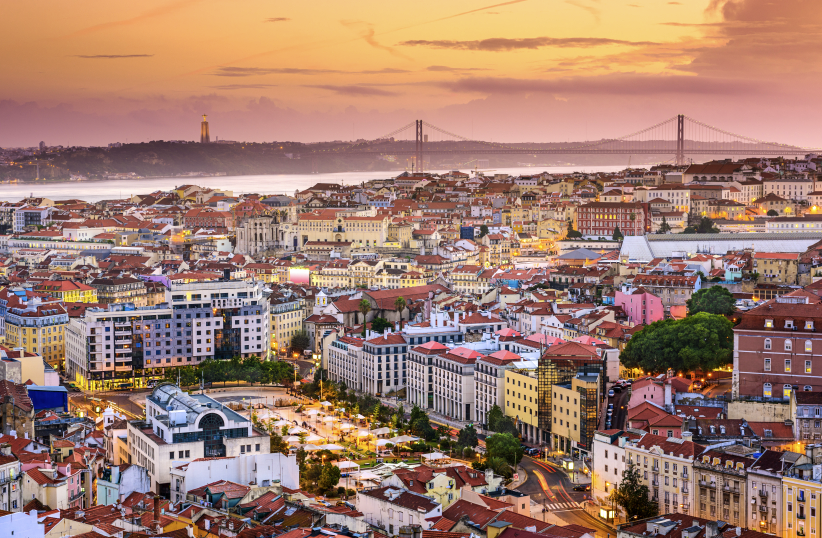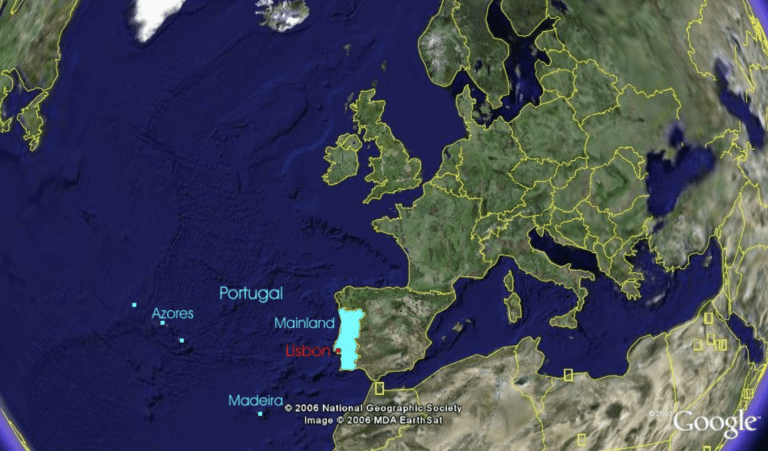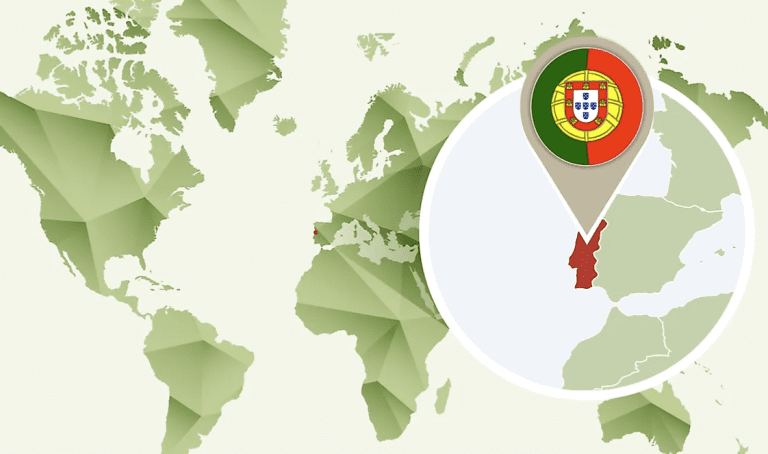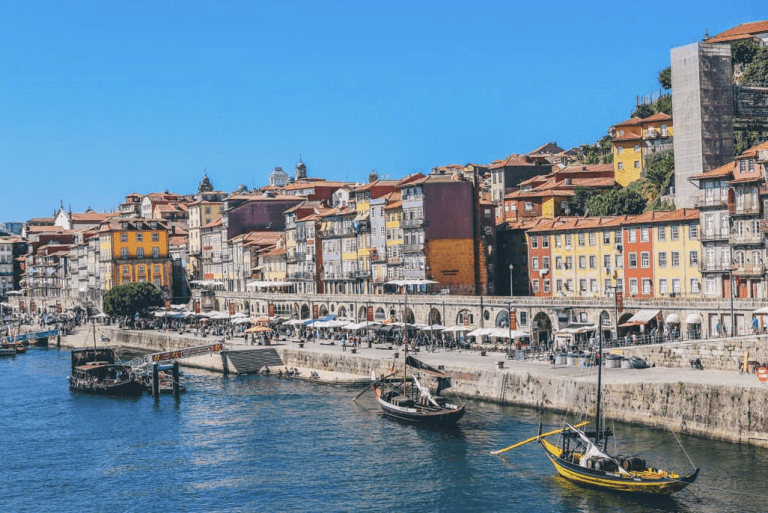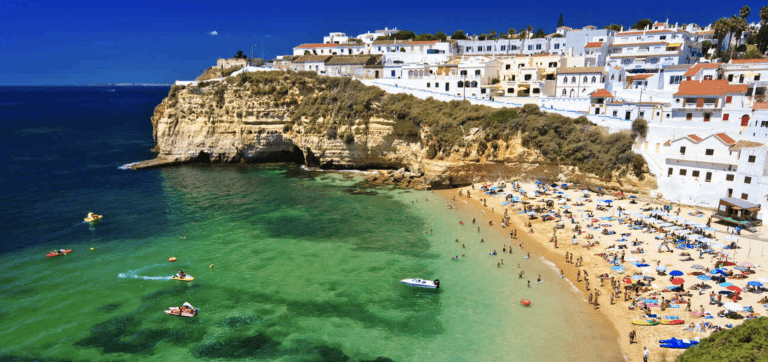What is the capital of Portugal? Lisbon, the official capital of Portugal located on the Iberian Peninsula’s Atlantic coast and serving as its largest city and economic hub, is a vibrant destination with much to explore. This westernmost capital city in continental Europe has much to offer its visitors.
Lisbon lies on the Atlantic coast and serves as not only the largest city but also an economic hub for Portugal. It is one of the most visited European capitals due to its rich historical timeline, architectural marvels such as Vasco da Gama Bridge, and vibrant neighborhoods like Bairro Alto.
In this blog post we will delve deeper into understanding what makes Lisbon unique – from its political structure to its local culinary delights; from impact of tourism on Lisbon’s economy to education system in Portugal. So if you ever wondered “what is capital of Portugal”, continue reading to uncover fascinating aspects about Lisbon that make it a gem within the European Union.
Lisbon – The Heart of Portugal
Welcome to the vibrant city of Lisbon, the capital and largest city in Portugal. Known for its rich history, Lisbon is a fascinating destination that predates other European capitals by centuries. It’s not just an ancient city; it also holds political significance as a semi-presidential republic.

The historical timeline of Lisbon
Did you know that Lisbon has been inhabited since prehistoric times? Its strategic location on the westernmost frontiers of Europe made it a hub for trade between Mediterranean cultures and northern European tribes. Over time, Phoenicians, Greeks, Carthaginians, Romans, Moors, and finally Portuguese have left their mark on this beautiful city. Each era contributed to its unique architectural landscape, which we’ll explore more in our next section.
Political structure in Lisbon
Lisbon isn’t just known for its beauty but also plays an important role politically as well. As the capital of Portugal, it houses all major governmental institutions including the President’s official residence at Belem Palace and Sao Bento Mansion – home to the Parliament Assembly. This makes it central to decision-making processes affecting both national and international affairs. Learn more about how politics works in this country.

Beyond being merely administrative headquarters, it serves as the cultural heartbeat of the nation where traditional customs blend seamlessly with modern trends, creating a dynamic atmosphere unlike any other place in the world. Whether you’re interested in exploring historical sites or experiencing the local lifestyle firsthand, there’s something for everyone here at the heart of Portugal.
In our upcoming sections, we will dive deeper into various aspects that make up the essence of what it truly means to be a Lisboeta (a native resident), from architecture and neighborhoods to cuisine, climate, tourism, economy, and the education system. So stay tuned, the journey continues…
Lisbon, the capital of Portugal, is a vibrant city with a rich history that dates back centuries. It not only boasts unique architecture influenced by various cultures but also holds political significance as the administrative hub of the country.
Architectural Marvels & Neighborhoods in Lisbon
If you’re a fan of architecture, history, or simply love to explore vibrant neighborhoods, then Lisbon, the capital city of Portugal, is your perfect destination. The city boasts an array of architectural styles and traditions that tell tales from different eras.
Exploring La Baixa neighborhood
The heart of downtown Lisbon, known as La Baixa, is a testament to 18th-century urban planning. Its grid-like layout filled with neoclassical buildings makes it one-of-a-kind among European capitals. You’ll find plenty of shops, cafes, and historic sites like the impressive Praca do Comercio here.
Unveiling charms of Chiado district
Moving uphill from La Baixa brings you to Chiado. This bohemian district offers charming old bookshops, local designer boutiques, and iconic cafes such as A Brasileira where poet Fernando Pessoa used to write his verses. Don’t miss out on visiting the stunning Sao Roque Church, which houses magnificent baroque art pieces.
Nightlife at Bairro Alto
Come sundown, head over to Bairro Alto. Known for its lively nightlife scene with Fado music echoing through narrow cobblestone streets lined by colorful buildings adorned with traditional tiles called azulejos. Bairro Alto takes on a new life when night falls.
Historical insights from Alfama
Alfama, one of Lisbon’s oldest districts, provides deep historical insights into the Moorish era reflected in its maze-like alleys leading up towards Saint George Castle, offering panoramic views over red-roofed homes down below.
Cultural offerings at Belem
A trip to Lisbon would be incomplete without visiting Belem. Home to monuments like Jeronimos Monastery and Tower Of Belem – both UNESCO World Heritage Sites – this area stands as a symbol for the Age Of Discoveries period shaping Portuguese identity even today.
Modernity meets tradition at Parque das Nacoes
Last but not least, “Parque das Nacoes” (Park Of Nations) represents the modern side, featuring futuristic architecture including Oceanario de Lisboa (one of Europe’s largest aquariums) and Vasco da Gama Bridge (the longest bridge in Europe), amidst beautifully landscaped gardens along the Tagus Riverfront, giving a glimpse into the future while maintaining a connection to the past.
Lisbon, the capital of Portugal, offers a diverse range of architectural marvels and vibrant neighborhoods to explore. From the grid-like layout of La Baixa to the bohemian charm of Chiado and the historical insights of Alfama, there is something for everyone in this city. Don’t miss out on experiencing the lively nightlife scene in Bairro Alto or visiting cultural landmarks like Belem and Parque das Nacoes.
Culinary Delights & Local Specialties Of Lisbon
When it comes to food in Lisbon, prepare for a taste bud extravaganza. Lisbon’s cuisine is as multifaceted and dynamic as its culture and heritage.
Pasteis da nata – A sweet treat from Portugal
The Pasteis de Nata, also known as Portuguese custard tarts, are Lisbon’s sweetest claim to fame. These little pastries are like a party in your mouth, with creamy egg custard filling and flaky puff pastry crusts. Sprinkled with cinnamon and powdered sugar, they’re a delightful indulgence. Originating from Belem district, these tarts have now become synonymous with Portuguese cuisine worldwide.
Culinary journey through traditional Portuguese dishes
But wait, there’s more to Lisboan cuisine than just Pasteis de Nata. Get ready to dive into traditional dishes like Bacalhau à Bras (codfish delight), Arroz de Pato (duck rice), or Cozido à Portuguesa (Portuguese stew). These mouthwatering meals reflect the rich culinary heritage of Portugal.
Seafood lovers, rejoice. Lisbon’s fresh and diverse seafood offerings will make your taste buds dance. Don’t miss out on Polvo à Lagareiro (olive oil-roasted octopus), Sardinhas Assadas (grilled sardines), or Caldeirada de Peixe (a fish stew that’s pure bliss).
And let’s not forget about the cheese. Queijo da Serra da Estrela, a heavenly sheep milk cheese, and the flavorful Chourico sausage are perfect companions to local wines.
Thirsty? Quench it with a sip of Ginjinha, a cherry liqueur served in chocolate cups. It’s a fun twist on a traditional drink.
Lisbon isn’t just about eating; it’s about exploring a world of flavors. From street vendors selling grilled chestnuts in winter to summer markets overflowing with fresh fruits and veggies, there’s always something delicious waiting around the corner.
If you want to take your culinary skills to the next level, join Lisbon Cooking Classes and immerse yourself in the authentic culinary culture of this vibrant city.
No matter what your taste buds crave, Lisbon’s got you covered. Next time you’re meandering around, questioning where to chow down, keep in mind that the options are seemingly infinite. Prepare for a gastronomic adventure that will leave you craving more.
Lisbon’s culinary scene is a vibrant and diverse mix of flavors, with the famous Pasteis de Nata being a must-try sweet treat. From traditional Portuguese dishes like Bacalhau à Bras to fresh seafood options like Polvo à Lagareiro, there’s something for everyone in this gastronomic adventure.
Tourism & Climate in Lisbon
Known for its rich history, stunning architecture, and vibrant culture, Lisbon never fails to charm visitors. Its subtropical-Mediterranean climate makes it an ideal destination for tourists all year round. Let’s dive into the impact of tourism on Lisbon’s economy and how the city’s climate and efficient transport system contribute to this.
Impact of Tourism on Lisbon’s Economy
The tourism industry plays a crucial role in boosting Lisbon’s economy. Millions of travelers visiting annually have resulted in a rise in job openings connected to hospitality, food service, retail commerce and transportation services. According to Portuguese Government data, tourism contributes about 20% towards Portugal’s GDP, with a major chunk coming from Lisbon itself.
Lisbon’s Subtropical-Mediterranean Climate
Lisbon enjoys a unique subtropical-Mediterranean climate, allowing exploration all year round. Summers are warm but not excessively hot, thanks to the cooling Atlantic breezes, while winters are mild compared to most European capitals. This means you can enjoy outdoor activities like sightseeing or beach visits anytime you choose. For a breakdown of yearly climate conditions, take a look at this useful guide.
The Efficiency and Convenience Provided by Metro Services
Beyond its appealing weather conditions, another factor that enhances the tourist experience is an efficient transport system featuring Metro services, providing convenient travel options around town. The Lisbon Metro System is one of Europe’s finest subway systems – it’s clean, efficient, and covers almost every part of the city, making it easy for tourists to explore different neighborhoods without hassle. Here are some key features:
- Frequent Service: Trains run every few minutes during peak hours, so you won’t have long waits between rides.
- Coverage: Four lines cover much of central Lisbon, including many popular tourist destinations.
- Affordability: Compared with taxi fares or car rental costs, metro tickets are very affordable, making them great value, especially if you’re planning multiple trips per day. You can also buy daily passes for unlimited travel within certain zones.
Lisbon’s tourism industry has a significant impact on the city’s economy, contributing about 20% to Portugal’s GDP. The subtropical-Mediterranean climate of Lisbon allows for year-round exploration and outdoor activities, while the efficient metro system provides convenient transportation options for tourists to easily navigate the city.
Economic Growth and Stability in Lisbon
Lisbon, the capital city of Portugal, is a powerhouse driving regional economic growth and stability. Its bustling commercial activities and administrative roles contribute to a robust economy that keeps the region thriving.
Multinational Companies: Power Players in Lisbon
Lisbon is home to multinational corporations like EDP-Energias de Portugal, Galp Energia, and Jeronimo Martins. These global entities not only create jobs and attract investments but also foster innovation through research and development. They play a vital role in promoting international trade relations, making Lisbon a hub for export-import activities.
Gateway to the World: Lisbon Portela Airport
Strategically located on Europe’s western coast, Lisbon is an ideal gateway for air travel. The Lisbon Portela Airport connects millions of passengers to major cities worldwide. This airport not only supports tourism but also fuels sectors like logistics and freight services, creating numerous job opportunities and contributing to regional GDP growth.
Education System in Portugal
The Portuguese education system is designed to prepare younger generations for future challenges. Supported by the Ministry of Labour, Social Solidarity (MLSS), it comprises three cycles, each lasting four years, providing a comprehensive learning experience from primary level to higher studies.
Educational Cycle Breakdown
The first cycle focuses on basic literacy skills, while the second emphasizes subject-specific knowledge in disciplines like Mathematics and Science. The third cycle offers advanced vocational training or academic specialization based on individual student choices. For more details about this structure, visit the official Directorate-General for Education website.
Government Initiatives for Citizen Awareness
MLSS has initiated several programs to increase citizen awareness of current global issues and encourage proactive participation in society building a better tomorrow. These initiatives include environmental conservation drives and digital literacy campaigns. Find more information about these programs on the Government Portal Page.
Lisbon, the capital of Portugal, is a thriving city with a strong economy driven by multinational companies and its strategic location as an international gateway. The education system in Portugal focuses on preparing younger generations for future challenges, while government initiatives aim to increase citizen awareness and participation in building a better society.
Education System in Portugal
The education system in Portugal is a fascinating mix of tradition and innovation. It’s like a dance between old-school knowledge and new-age skills.
Education Cycle Breakdown
In Portugal, education is divided into three cycles. It’s like a three-course meal, yet instead of food, you’re getting an abundance of knowledge.
The first cycle is all about the basics – reading, writing, and arithmetic. It’s like the ABCs of education.
The second cycle takes things up a notch. It’s like a thrilling journey, giving learners exposure to new tongues, natural sciences, and the past.
The third cycle is where the real magic happens. It’s like a wizard’s apprenticeship, diving deep into advanced studies in subjects like mathematics, literature, or physics.
For those seeking to hone their skills, vocational courses offer a wealth of opportunities for specialized training. It’s like a choose-your-own-adventure book, but instead of dragons and treasure, you’re learning practical skills for specific professions.
Government Initiatives Towards Citizen Awareness Programs
The Portuguese government is not just about textbooks and exams. They’re also into citizen awareness programs. It’s like adding a pinch of spice to the educational recipe.
One of their initiatives is “Educacao para a Cidadania” – Education for Citizenship. It’s like a fast-paced lesson in democracy, instructing pupils about their civil liberties and motivating them to be involved citizens.
Another cool initiative is ‘Escola Digital’ – the digital school. It’s like giving every student a backstage pass to the internet, ensuring they have access to connectivity and necessary equipment.
These efforts not only keep citizens informed but also empower them to shape a brighter tomorrow. It’s like handing out the opportunity to unlock potential for tomorrow.
Conclusion
Discover the architectural wonders and lively neighborhoods of Lisbon, where every corner tells a story.
Indulge in the mouthwatering culinary delights that Lisbon has to offer, from traditional pastel de nata to fresh seafood.
Experience the economic impact of tourism on Lisbon’s thriving economy, as visitors flock to explore its vibrant streets.
Uncover the role of commercial activities and administrative roles in driving the region’s growth and stability.
Get insights into Portugal’s education system and government initiatives, ensuring citizen awareness and empowerment.
With its rich blend of history, culture, modernity, and endless opportunities, Lisbon is a city that never fails to captivate.

